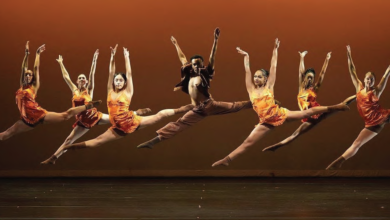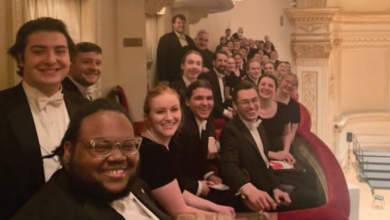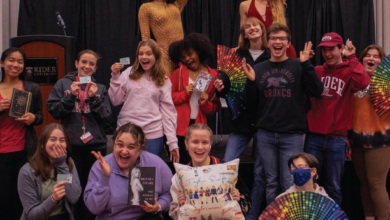
Black and Gold: professor writes new ‘Wonder Woman’ comic
By Jeremy Hester
On Nov. 23, Eisner Award winning writer and Rider communications professor Sheena Howard made her debut into mainstream comic books with a story about the “Amazing Amazon” of DC Comics: Wonder Woman.
Her love for comics began over 10 years ago at Howard University. As one of the youngest people in her doctoral program, she was less sure of what to choose for her dissertation topic than her peers.
“I started to just pay attention to the things I was interested in at the time,” she said. “I happened to be really into ‘The Boondocks’ comic strip. Most people probably now are familiar with ‘The Boondocks’ animated series, but it was a comic strip first. … I wrote my dissertation on the history of Black comics, with a focus on ‘The Boondocks.’”
“The Boondocks,” which ran from 1996 to 2006, was a popular yet controversial comic strip by Aaron McGruder that satirized Black culture and American politics. Howard explained that she was drawn to the strip because she enjoyed seeing how the main character, Huey’s, social justice views contrasted with his brother, Riley’s, gangster rap ideals.
“You kind of got two opposite perspectives on social issues, and it showed different sides of the African-American community,” she said.
Howard’s dissertation led her to continue studying the relationship between Black culture and comics, resulting in works such as 2013’s “Black Comics: Politics of Race and Representation” and 2017’s “Encyclopedia of Black Comics.” It was because of all this research that she developed a deep appreciation for comic books, which continues to this day.
“When you think about the civil rights movement, you think of all the great speakers and orators, you know. The Martin Luther Kings of the world,” Howard explained. “But I found it fascinating that comics were also a part of the civil rights movement. For me, I started to appreciate comics as a place to tell hard, difficult stories but through the lens of art.”
One of her most recent deep dives into the history and culture surrounding Black comics comes in her book, “Why Wakanda Matters: What Black Panther Reveals About Psychology, Identity and Communication” which was published earlier this year.
Howard cited the success of 2018’s “Black Panther” film as the main inspiration for editing the collection of essays. She explained, “I wanted to understand the psychology behind the excitement. Why was this movie so impactful on American culture and Black culture? That’s when the seed of the book started for me.”
In the book, Howard and several other experts were able to use the character T’Challa from “Black Panther,” who is the king and protector of the fictional nation of Wakanda, as a jumping-off point to discuss topics like cognitive dissonance, intergenerational trauma and cultural and racial identity.
“I wanted to give back to my community, and this was a great way to do it because the book talks about mental health themes from an African-American perspective and how we can use these concepts for a more healthy, better life,” Howard said.
Howard has spent the last several years balancing her career in writing and analyzing comic books with her role as a professor of communications at Rider. Her passion for teaching college classes came to fruition around the same time as she developed a passion for comics.
“I always wanted to be a teacher,” Howard reflected. “I actually started out as an elementary education major. But in the first semester, in the first class, I was like ‘yeah, I definitely don’t want to work with little kids.’”
She paid her tuition at Howard as a doctoral student by teaching undergraduate classes, and the experience allowed her to find her calling as a college educator.
“The rest is history,” she said with a sentimental smile.
Howard’s comic book writing has also deeply affected the way she teaches at Rider. Not only has her experience allowed her to develop the Script Writing for Comic Books class, but her creative writing philosophy has deeply informed the way she teaches her students.
“I continue to try to be fearless in how I’m growing as a writer,” she said. “I definitely think that attitude transfers into the classroom, in the sense of being able to empower students and talk about my journey and helping them be fearless in the things they want to create.”
One student who was empowered by Howard’s fearlessness was Christy Akinsanmi, a senior theater major who took her Gender and Communications class. Akinsanmi was inspired by Howard as a professor, remarking that it was a wonderful experience to have an educator “eager to engage with students, teach us and encourage our growth.”
Akinsanmi mentioned how encouraging it was to look up to a successful woman of color.
“Discrimination is inescapable, and it’s really easy to feel pessimistic about the future,” she said. “Dr. Howard’s career and journey are proof of how preparation, knowledge and creativity can help you succeed and do what you love even when the world is against you.”
One of the most recent examples of Howard’s creativity leading to success is her involvement in the new DC Comics anthology series “Wonder Woman: Black and Gold.” Howard wrote a story in which Diana Prince’s Wonder Woman and Nubia, who is Black and also goes by Wonder Woman, team up in Philadelphia to fight evil.
“I really love the story. I’m a little biased, obviously,” Howard said with a chuckle. “But it was just great to give a shout out to my hometown and also write this iconic character which was really important to me. It was definitely an honor to write Wonder Woman as well as the Black Wonder Woman, and I’m looking forward to that book hitting the stores.”
“Wonder Woman: Black and Gold #6” was released on Nov. 23, but Howard hoped that it wouldn’t be the last Wonder Woman title with her name attached to it.
“Ultimately, I really would like to be a long-term writer for Wonder Woman,” she gushed.
But wherever the future takes her, this writer and professor takes on each new project with the goal of uplifting diverse voices and challenging negative stereotypes surrounding black people.



